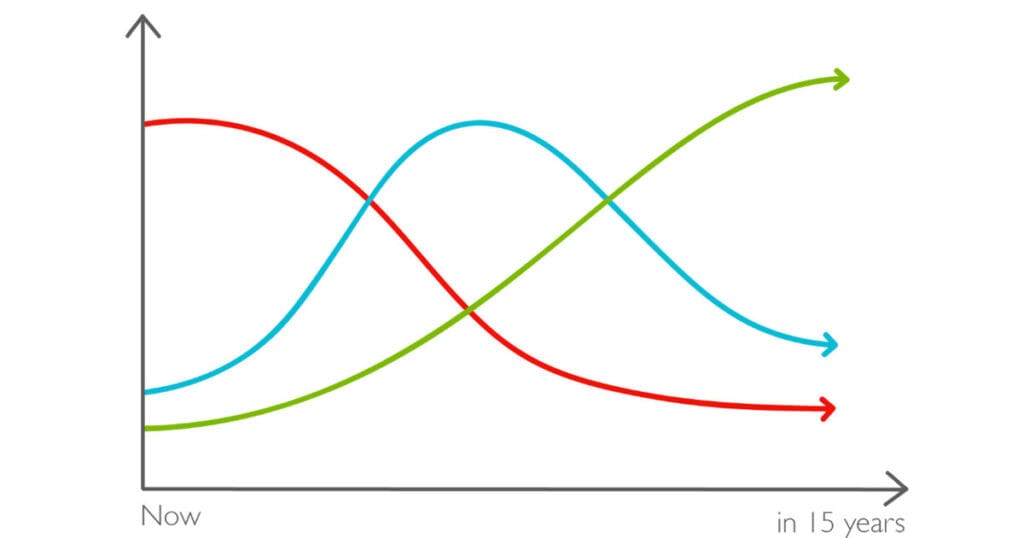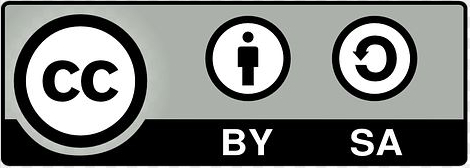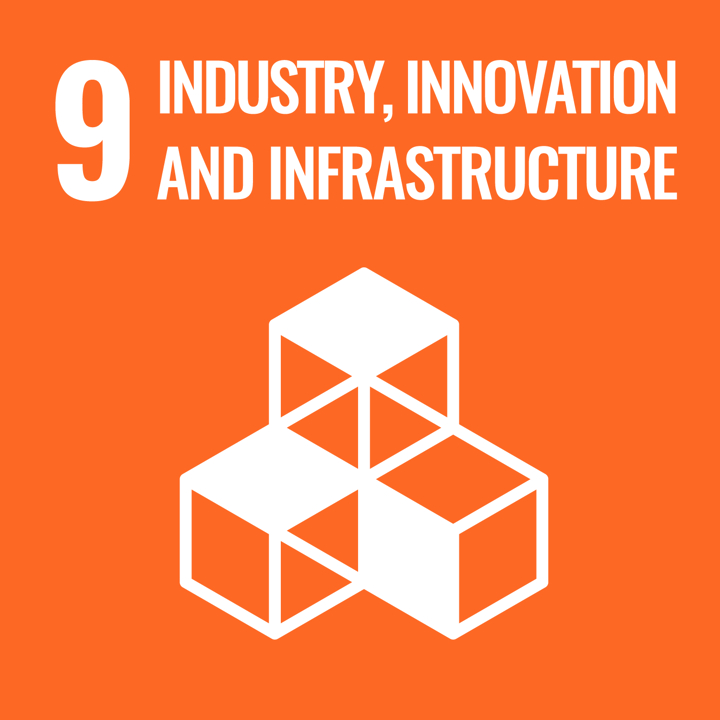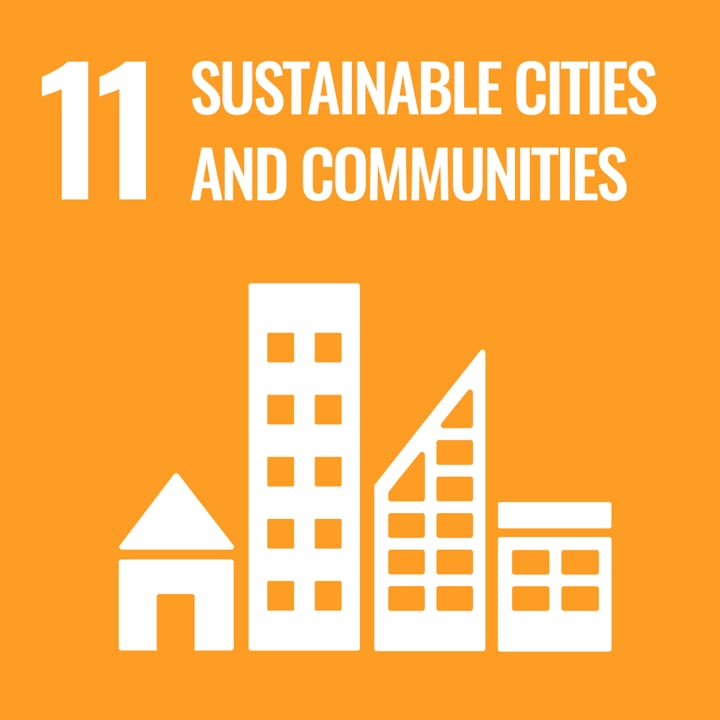
Προβλεπόμενος τελικός χρήστης: Δάσκαλος, Διευθυντής Σχολείου
Ηλικιακή ομάδα: Κατώτερη Δευτεροβάθμια- Ανώτερη Δευτεροβάθμια
Σχολικό πρόγραμμα σπουδών: Science; Social & Environment Science; Business Studies; Applied Science
Θέματα και θεματικές ενότητες: Collective Action; Economics; Futures Thinking; Food and Agriculture; School Leadership; Information & Knowledge
Διάρκεια: 90 minutes to 2 hours.
Τύπος πόρου: Guidelines & Notes, Workshop
Λέξεις-κλειδιά: Futures Literacy, Three Horizons Framework, Multiple Perspectives, Student-Centred Learning, School Leadership
Γλώσσες: Αγγλικά
Περιγραφή
Το Three Horizon model gives us a deeper understanding of the significance of what we usually call short, medium and long-term futures. The model is based on the observation that businesses, technologies, political policies and even whole civilisations exhibit life cycles of initiation, growth, peak performance, decline and even death. These cycles can be viewed as waves of change in which a dominant form is eventually overtaken and displaced by another.
The Three Horizons Tutorial and Facilitation Guide by H3Uni, can help teachers and school leaders to understand different perspectives about the future and map what needs to be done today. The facilitation guide provides instruction on how to build a Three Horizon sense-making map of an issue of concern in a way relevant to formulating visionary action for innovation and transformation.
The additional video introduction to the Three Horizons provide examples of how this framework can explore issues of food production. The Three Horizons Framework can be a valuable tool for stimulating a whole school or open school approach to Sustainability Citizenship.
Πώς να χρησιμοποιήσετε αυτόν τον πόρο
To use the Three Horizons Framework with students or stakeholder participants, the scope and purpose need to have been agreed, at least in draft form, before the session is convened. The Three Horizons Framework will be used in stage 1 of a 2-stage process. Stage 1 focuses on sense-making and moving out of horizon mindsets into the three horizon perspectives of futures consciousness.
Stage 2 is Three Horizons Action Planning. These are normally separate sessions with some time between, even if just a break in the day. Optionally, you can also insert the Three Horizons Multi-Actor Mapping method between stages 1 and 2 to broaden the understanding from the perspective of other actors.
Οι πόροι
H3Uni provide a Tutorial introduction to the Three Horizons Framework for those new to the approach. This will help you understand the terminology and how to use the resources. The Three Horizons Tutorial can be accessed here.
The Facilitation Guide can then be used to help teachers or school leaders lead a group of students or stakeholders through the process of Three Horizons thinking to engage with a recognised and agreed-upon challenge to create a sense-making map of an issue of concern in a way relevant to formulating visionary action for innovation and transformation. The Facilitation Guide can be accessed here.
Further Three Horizons introductory videos have been created by Future Stewards. The Introduction to Three Horizons και Three Voices videos are good supporting resources to engage participants on the topic of food production.
Το H3Uni Resource Library provides tutorials and facilitation guides for methods and frameworks to improve your and your organisation’s effectiveness. These open-access resources promote strategies that will help you to transcend limitations and release untapped potential.
Μαθησιακά αποτελέσματα (εκπαιδευτικοί)
- Αναζήτηση προηγούμενων γνώσεων και περαιτέρω ανάπτυξη της γνώσης και της κατανόησης βασικών εννοιών της Αειφόρου Ιθαγένειας, αμφισβητώντας καθιερωμένες κοσμοθεωρίες και αξίες.
- Εφαρμογή μιας σειράς κατάλληλων εργαλείων και πλαισίων για την προώθηση της αειφόρου πολιτειότητας των μαθητών
- Αναστοχασμός της πρακτικής και εξέταση των εθνικών προγραμμάτων σπουδών για τον εντοπισμό ευκαιριών προώθησης της ιδιότητας του πολίτη της αειφορίας με διεπιστημονικούς τρόπους και συνεργασία με εξωτερικούς ενδιαφερόμενους φορείς.
- Συνθέτουν συνεργατικά τις γνώσεις, τα εργαλεία και τα πλαίσια για να δημιουργήσουν εκπαιδευτικό υλικό και σχέδια μαθημάτων προσαρμοσμένα στο δικό τους τοπικό πλαίσιο.
- Μέσω δραστηριοτήτων εργαστηρίων και κοινοτήτων πρακτικής, ανάπτυξη ικανοτήτων και δράσης ως εκπαιδευτές και ηγέτες της Αειφόρου Πολιτειότητας.
Μαθησιακά αποτελέσματα (Ηγεσία)
- Αναζήτηση προηγούμενων γνώσεων και περαιτέρω ανάπτυξη της γνώσης και της κατανόησης βασικών εννοιών της Αειφόρου Πολιτειότητας για να αμφισβητηθούν καθιερωμένες κοσμοθεωρίες και αξίες.
- Εφαρμόζουν μια σειρά κατάλληλων εργαλείων και πλαισίων για την προώθηση της Αειφόρου Πολιτειότητας στα σχολεία και τις κοινότητές τους.
- Να εξετάζουν τα δικά τους εθνικά/περιφερειακά προγράμματα σπουδών, τις εκπαιδευτικές πολιτικές, τα προγράμματα και τους εξωτερικούς ενδιαφερόμενους φορείς για να εντοπίσουν ευκαιρίες προώθησης της Αειφόρου Πολιτειότητας στα σχολεία και τις κοινότητές τους.
- Συνθέτουν συνεργατικά τη γνώση, τα εργαλεία και τα πλαίσια για να δημιουργήσουν ένα όραμα για τη δημιουργία ενός σχολικού περιβάλλοντος που θα υποστηρίζει την ανάπτυξη της Αειφόρου Πολιτειότητας στην κοινότητά τους.
- Μέσω δραστηριοτήτων εργαστηρίων και κοινοτήτων πρακτικής, ανάπτυξη ικανοτήτων ως εκπαιδευτές και ηγέτες της Αειφόρου Πολιτειότητας.
Πράσινες ικανότητες
- Ενσάρκωση βιώσιμων αξιών: Αποτίμηση της βιωσιμότητας
- Αγκαλιάζοντας την πολυπλοκότητα στη βιωσιμότητα: Συστημική σκέψη; Κριτική σκέψη; Διαμόρφωση προβλημάτων
- Οραματιζόμενοι βιώσιμα μέλλοντα: Μελλοντική παιδεία- Προσαρμοστικότητα- Διερευνητική σκέψη
- Δράση για τη βιωσιμότητα: Συλλογική δράση
Creative Commons

The Three Horizons Framework resources shared here were created by H3Uni and share under the Creative Commons Attribution-ShareAlike 4.0 International (CC BY-SA 4.0) license framework.
SDGs





